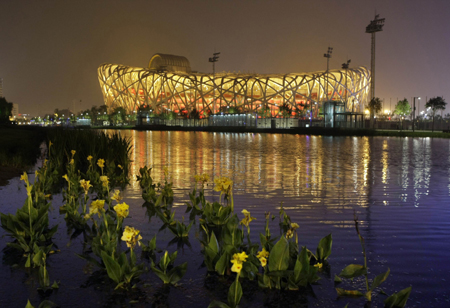BEIJING -- Beijing has mobilized all its science and engineering capability, including satellite monitoring and cloud seeding, to prevent rain from spoiling the extensively expected Olympic opening ceremony on August 8 as historical data indicate a 41 percent precipitation chance on that date.
 The National Olympic Stadium, also known as the Bird's Nest, is lit by coloured lights at the Olympic Green in Beijing July 23, 2008. The venue willl host the openning and closing ceremonies for the Olympic Games. [Agencies]
The National Olympic Stadium, also known as the Bird's Nest, is lit by coloured lights at the Olympic Green in Beijing July 23, 2008. The venue willl host the openning and closing ceremonies for the Olympic Games. [Agencies] |
The Beijing weather engineering office, under the Beijing Municipal Meteorological Bureau, takes the lead in the Olympic weather modification project.
The office doesn't bother to change a lot. It is asked to prevent rain from falling during the three and half hours -- from 8:08 p.m. to around 11:30 p.m. -- onto the Bird's Nest, the open-air National Stadium which will accommodate the opening ceremony.
A technology developed by American scientists, cloud seeding is achieved by shooting shells or rockets containing silver iodide particles into clouds. The icy particles freeze drops in the clouds, make the drops continue growing and eventually fall out of the clouds.
The weather engineering office is weaving a defensive web from adjacent provinces to the Beijing suburbs. Twenty-six control stations have been deployed to fend off clouds or delay their movement.
The office hires 32,000 people, and recruits light aircraft, rockets and shells to spread silver iodide crystals or dry ice in clouds 50 km upwind of Beijing. Result estimates can be reported from control stations to the headquarters within 10 minutes.
One silver iodide shell costs up to 88 yuan (US$12.75), one rocket is priced at 2,000 yuan (US$290), and one aircraft trip spends much more. About 100 shells or four rockets are used in each single action, according to experts.
The office claimed to have eliminated a cloud by airborne spread of infusorial earth on its top on June 2, 2005, which was not found documented in an academic journal.
Meteorologists need to capitalize on radars and weather satellites to monitor colossal storms, which are usually unpredictable, and set off early warnings for Olympic weather services.
One main strategy of the meteorologists is to engineer weather in order to keep the Olympics dry for at least the first three and half hours. Such research and experiments have been conducted since 2001 when Beijing successfully bade for the Olympic host.
Many meteorologists agree that cloud seeding technology is only effective to small or mid-sized clouds and thus impossible to influence giant storm systems, which can cover up to a hundred square kilometers. The methodology is employed basically to speed up rain, delay rain, or change the place where rain falls, one Beijing-based expert said.